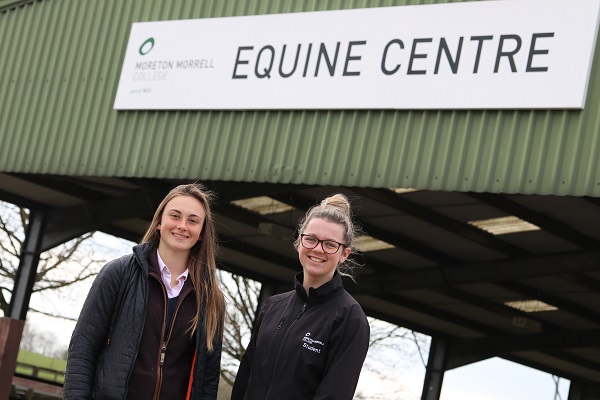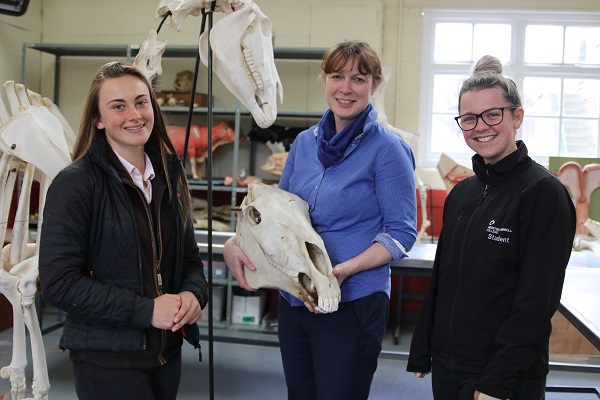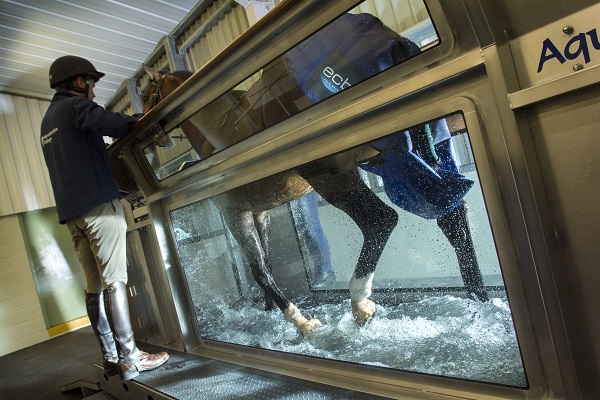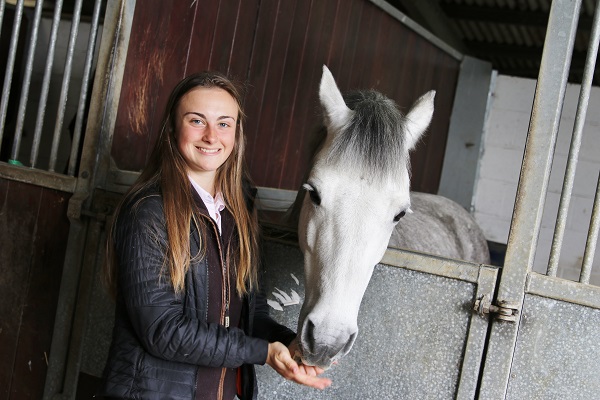Posted: 9th May 2019 | Back to news feed


Photo - Phoebe Dannatt and Amy Burr at Moreton Morrell College
If you’re dotty about dogs or potty about ponies, then a career as a veterinary physiotherapist could be the life for you! Vet physios help our four-legged friends in the treatment or long-term management of many musculoskeletal or neurological injuries and conditions.
A science-based profession, it assists rehabilitation of the animal, with the aims of reducing pain, improving movement and restoring normal muscle control and function.
Not that long ago, anyone considering a career as a vet physio would first have had to get a degree in human physiotherapy. Not so any longer. The National Association of Veterinary Physiotherapy (NAVP) is widely recognised in the industry for pioneering the very first direct-entry routes for veterinary physiotherapy training, at both postgraduate and undergraduate level.
Since 2014,Moreton Morrell College in Warwickshire has been one of three academic institutions in the UK offering this training option. A renowned centre of excellence in land-based education since 1948, the college offers a range of equine-related degrees as well as higher education options in animal welfare and vet nursing, as well as veterinary physiotherapy.
Two students who are studying aVeterinary Physiotherapy BSc (Hons) degree course are Phoebe Dannatt and Amy Burr. Phoebe, age 21 from Wiltshire, chose to study the course as she had always wanted to become an animal physiotherapist since she was a youngster. She explains: “Originally, I thought the only way for me to achieve this would be to gain a human physiotherapy degree before specialising in animal physiotherapy.”
It was during her A-levels, however, that she came across an article about the new courses that were being developed by the NAVP. A keen horsewoman, after a few visits to the college she knew this would be the course for her. “I’m at home in the countryside, so loved the agricultural feel, fabulous equine facilities and variety of riding events,” she adds.
Her fellow student Amy had always dreamed of becoming a riding instructor and having her own yard. The 21-year-old from Birmingham says: “The more research I did into why we ride in certain tack types, why we did certain schooling exercises, and the importance of rider position on the way the horse moved, the more I became fascinated with the equine musculoskeletal system, it’s physiology and biomechanics.”
“I considered studying equine therapy and rehabilitation as I didn’t even know a veterinary physiotherapy course existed as a Bachelor of Science degree, but when I found it and I examined the course modules, I realised what a well-rounded, but equally specifically-tailored course it was to my career aspirations.”
What do undergraduates study?
Students study the equivalent of eighteen 20-credit modules over the three year duration of the full-time course, along with a variety of work placements. The pair have really enjoyed the course programme with its fascinating mix of theory and practical lessons, in and outside the classroom.

Photo - Phoebe, Rachael Kendall, Head of Department and Amy
Phoebe says: “The main focus of our first year was getting a good understanding of equine and canine, anatomy and physiology. During the second and third years we really honed in on our palpation skills for assessment and then treatment, putting together plans for our treatments and exercise programmes that could be sent home with owners.”
Amy continues: “At the moment we do three days a week, consisting of a mixture of lectures and practical sessions.These can be fairly intense days but are always varied, so it’s never dull. We have smaller hands-on practice groups which enable you to get one-on-one time with your lecturers.”
“The other two days, as a class, we’ve generally ended up working within the field, such as hydrotherapy centres, yards and kennels. The lessons you learn from the industry are extremely valuable, they enable you to practice what you have learned and it also helps ‘create the bigger picture’ in what you have learned in theory.”
Highlights of the course
Three years at Moreton Morrell working closely with animals has brought many highlights. Phoebe says: “I’ve gone from not having a clue of what I was examining
to being able to confidently assess a patient, perform a treatment both manually and with electrotherapies, and prescribe home exercise to benefit the case. I feel I really am ready to start my own business and provide a well-equipped veterinary physiotherapy service.”
“The course has really helped me develop as a person. Having had a few struggles prior to starting my course, I have developed both mentally and socially. There isn’t a massive nightlife experience here at Moreton Morrell but the people with me throughout my time here have been amazing.”
“I’ve made a number of really great friends both on and off my course, also, having been a livery here at Moreton Morrell I have developed relationships with the yard staff who have given me further valuable experiences, additional advice and lessons.”
“As a person, the course has helped me become more outgoing, I find it much easier to interact and communicate with others, which is a huge part of being a veterinary physiotherapist.”
A small and friendly campus
Both Phoebe and Amy have felt that that the friendly, close-knit college community and teaching style at Moreton Morrell has really suited them.
“We’re very fortunate that Moreton Morrell is a small campus with small groups of students. Your lecturers know you by name pretty quickly, which can be a blessing in disguise as you never get lost in the crowd, but if you haven’t been practicing enough, they’ll notice,” says Amy.
“I’m lucky that I got to work with college staff outside of studies as well. I used to work at the college bar and we’d work closely with lecturers that also were wardens for the campus. It was great getting to know them as people. They really do want you to succeed and be the best practitioner you can be and it really shows.”
“Rachael Kendall, our course leader is also constantly supporting us, even when we go into pre-exam stress. And now, near the end of third year, it’s not just academic-related stuff we go to her for, it’s general life advice!”
Specialist land-based college with outstanding equine facilities

Photo - Moreton Morrell Equine Therapy and Rehabilitation Centre
Moreton Morrell College is an international leader in the development and delivery of specialist equine degree courses and has outstanding facilities. The veterinary physiotherapy programme makes extensive use of the Equine Therapy and Rehabilitation Centre, which includes a purpose-built treatment barn for developing clinical practice.
Set in 750 acres of rolling Warwickshire countryside, the college’s equine unit is approved by the British Horse Society as a ‘Where to Train’ centre. The campus has stabling for more than 120 horses, 60 well-schooled competitive horses and an on-site farriery centre and forge. It’s one of the few centres of study that offers livery for students.
The opportunity of spending her undergraduate years alongside her beloved ponies has been a fantastic experience for Phoebe, who has been a livery at the college for the whole three years.To start with, she brought a newly backed pony Konker, who she had rescued as a two-year-old.
She explains: “The facilities enabled me to bring him on and develop his ability on the flat, with his first jump being in the covered arena a few months later. Then last May we took part in his first one-day event at the college where we achieved a respectable dressage score and a clear show-jumping round.
“Sadly Konker has little legs and we didn’t make the time out cross-country but for his first event I was over the moon. I wouldn’t have achieved this without the help from the other liveries or the yard staff.”
Phoebe has taken full advantage of the weekly riding club lessons that are provided for those who want them. She has been able to organise teams for various dressage and showjumping club competitions, both at college and away.
“Last year I brought my newest pony Smokey to the college yard while Konker has been at home for other members of the family to ride. Smokey excels at jumping, so I am looking forward to taking him to the May Horse Trails run here at Moreton Morrell.”
“Having a pony with me throughout my time here has been brilliant,” she says. “I don’t have to travel far to see him - a four minute walk from my room - and has given me an excuse to take necessary breaks from my work!”
Both ponies have been used in her practical lectures and she has been able to regularly practice her physiotherapy skills on them. She adds: “I don’t often get a lie in but I really wouldn’t have it any other way.”

Photo - Phoebe and Smokey
Top tips for prospective students
The girls have sound advice to students considering this course. Phoebe suggests: “Anyone who wants to do this course should try and gain some experience with animals beforehand. Not just with veterinary physiotherapists, but in a vets practice, canine rehoming centers and equine yards.”
“It is so important to have animal handling experience in order to feel comfortable. Those who just want to focus on one species must have experience in handling the other species, you can only pass if you are competent with both dogs and horses.”
Amy agrees. “Get as much experience as you can at kennels, vets, yards, farms, wherever has animals, it will come in useful where you don’t expect it. Nurture as many relationships as you can within the animal industry too. Not only will it be useful for clients eventually, it’s great to call in favours for practicing on different animals and for dissertation subjects,” she says.
After graduating from Moreton Morrell this year, both girls would like to become members of the NAVP and set up their own veterinary physiotherapy practice. Phoebe explains: “I may end up focusing more in the equine field although I will see what opportunities arise. I may even decide to lecture in veterinary physiotherapy!”
Amy says: “Maybe one day I will have my own yard and use my degree to complement any riding instruction exams I take, but at the minute I’m just excited to set up my own practice. I want to focus on performance horses but having two Labradors myself - one of which has hip dysplasia - the canine sector is also now very close to my heart.”
Explore facilities at the next open event
What to find out more? The next degree open events at Moreton Morrell College are scheduled for Saturday 18 May and Saturday 22 June, 10am - 1pm. For more information about Veterinary Physiotherapy studies call 0300 456 0049 or sign up for an open event here.
The Equestrian Index newsfeed is compiled from articles submitted by advertising members and expresses the opinions of those members. Watsons Directories Ltd shall not be held liable for any inaccuracies or mis-statements therein.